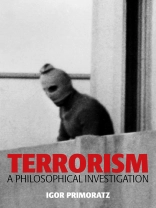This is the first comprehensive study of the core philosophical
questions posed by terrorism such as: How should we define it? Is
it morally distinctive? Can it be morally justified?
Igor Primoratz seeks to overcome relativism and double standards
that often plague debates about terrorism. He investigates the main
ethical approaches to terrorism: in terms of its consequences,
rights and justice, ‘supreme emergency, ‘ and the
collective responsibility of citizens. The book provides a
rigorous, yet accessible analysis of a range of moral positions,
from the acceptance of terrorism when its consequences are good on
balance to its absolute rejection. Primoratz argues that terrorism
is almost absolutely wrong. It may be morally justified only when
an entire people is facing a true moral disaster, and this should
be understood in a highly restrictive way.
Conceptual analysis and normative arguments about the practice of
terrorism are complemented with case studies of terror-bombing of
German cities in World War II and the role of terrorism in the
Israeli-Palestinian conflict.
Terrorism: A Philosophical Investigation will be
essential reading for researchers and students of philosophy and
politics, and the general reader seeking to understand and evaluate
acts and campaigns of terrorism.
表中的内容
Acknowledgments vi
Introduction 1
1 Defining Terrorism 7
2 State Terrorism and Counterterrorism 30
3 Complicity of the Victims 47
4 The Consequences of Terrorism 65
5 Terrorism, Rights, and Justice 84
6 Terrorism, Supreme Emergency, and Moral Disaster 95
7 Is Terrorism Morally Distinctive? 114
8 Case Study: Terror Bombing of German Cities 126
9 Case Study: Terrorism in the Israeli-Palestinian Confl ict 148
Summing up 170
Notes 176
References and Bibliography 180
Index 189
关于作者
Igor Primoratz is professorial fellow in the Centre For Applied Philosophy & Public Ethics at Charles Sturt University.












